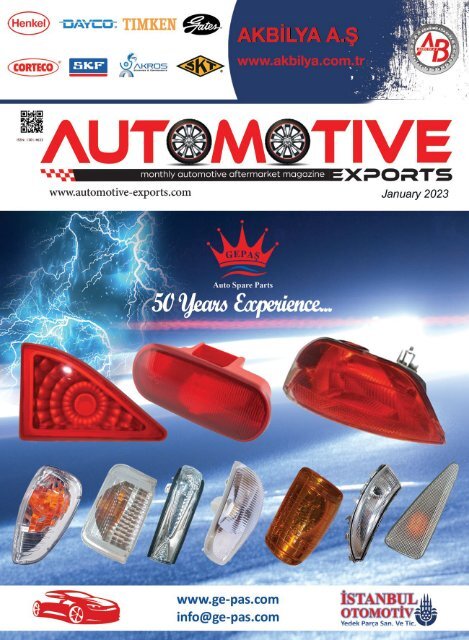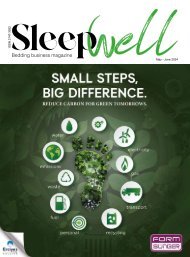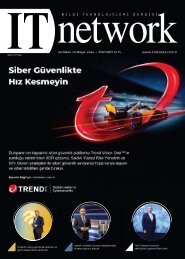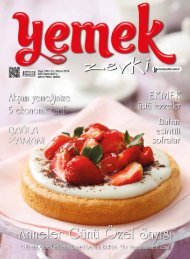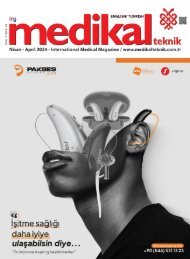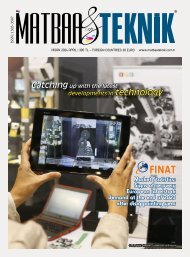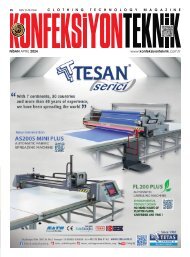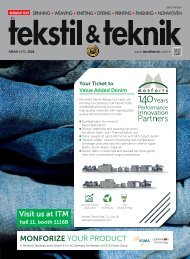Create successful ePaper yourself
Turn your PDF publications into a flip-book with our unique Google optimized e-Paper software.
1
Monthly automotive aftermarket magazine<br />
GROUP CHAIRMAN<br />
H. FERRUH ISIK<br />
PUBLISHER:<br />
İstmag Magazin Gazetecilik<br />
İç ve Dış Ticaret Ltd. Şti.<br />
Managing Editor (Responsible)<br />
Mehmet Söztutan<br />
mehmet.soztutan@img.com.tr<br />
Advertising Managers<br />
Adem Saçın<br />
+90 505 577 36 42<br />
adem.sacin@img.com.tr<br />
EDİToR<br />
Mehmet Soztutan, Editor-in-Chief<br />
mehmet.soztutan@img.com.tr<br />
Enes Karadayı<br />
enes.karadayi@img.com.tr<br />
International Marketing Coordinator<br />
Ayca Sarioglu<br />
ayca.sarioglu@img.com.tr<br />
Editor<br />
Yusuf Okçu<br />
yusuf.okcu@img.com.tr<br />
Finance Manager<br />
Cuma Karaman<br />
cuma.karaman@img.com.tr<br />
Digital Assets Manager<br />
Emre Yener<br />
emre.yener@img.com.tr<br />
Technical Manager<br />
Tayfun Aydın<br />
tayfun.aydin@img.com.tr<br />
Design & Graphics<br />
Sami aktaş<br />
sami.aktas@img.com.tr<br />
Accountant<br />
Yusuf Demirkazık<br />
yusuf.demirkazik@img.com.tr<br />
Subsciption<br />
İsmail Özçelik<br />
ismail.ozcelik@img.com.tr<br />
HEAD OFFICE:<br />
İstmag Magazin Gazetecilik<br />
İç ve Dış Ticaret Ltd. Şti.<br />
Ihlas Media Center<br />
Merkez Mah. 29 Ekim Caddesi No: 11B / 21<br />
Yenibosna Bahcelievler, Istanbul / TÜRKİYE<br />
Tel: +90 212 454 22 22<br />
www.img.com.tr sales@img.com.tr<br />
KONYA:<br />
Metin Demir<br />
Hazım Uluşahin İş Merkezi C Blok<br />
Kat: 6 No: 603-604-605 KONYA<br />
Tel: (90.332)238 10 71 Fax: (90.332)238 01 74<br />
PRINTED BY:<br />
İHLAS GAZETECİLİK A.Ş.<br />
Merkez Mahallesi 29 Ekim Caddesi İhlas Plaza<br />
No:11 A/41 Yenibosna–Bahçelievler/ İSTANBUL<br />
Tel: 0212 454 30 00<br />
www.ihlasmatbaacilik.com<br />
Dynamism prevails…<br />
We know that competitiveness at the domestic level has been replaced with<br />
competitiveness on a global scale, when it comes to automotive industry. The Turkish<br />
automotive industry, which was originally founded for import-substitution purposes and<br />
focused on the domestic market for a long period, transformed itself into a production<br />
base for a number of global models.<br />
In motor vehicles, a large number of EU legislation was adopted. Türkiye has been<br />
continuing efforts to introduce the relevant legal arrangements, and significant progress<br />
has been achieved in this field.<br />
Meanwhile, Türkiye’s first domestically produced electric vehicle brand, Togg will have a<br />
competitive price tag compared to its peers and even cars with combustion engines, once<br />
it hits the roads in the first months of <strong>2023</strong>.<br />
The Turkish automotive industry is one of the four largest exporting and leading investor<br />
industries of the Turkish economy. It is an economically strategic sector in terms of its<br />
significant contribution to the national production and development, direct and indirect<br />
employment and level of technology in Türkiye. The automotive parts industry is strong<br />
and competitive. It has developed in parallel with the development of Türkiye's automotive<br />
industry both in quality and production volumes.<br />
Following the shift of the focus on customers, markets, products and competition from<br />
the local level to the global level, Turkish automotive manufacturers and suppliers position<br />
themselves globally rather than locally.<br />
This transformation in the sector urges automotive suppliers to improve their existing<br />
structures in line with the demands of global auto manufacturers.<br />
Turkish producers of parts and components have attained high standards reflected by<br />
large export volumes to the Western countries.<br />
The Turkish automotive parts and components industry has now developed to the stage<br />
where it is at a level ready to take advantage of the globalization and structural changes in<br />
the world automotive industry. A number of firms active in the industry have been named<br />
the "co-designer" in the global vehicles manufactured in Türkiye.<br />
Our publications, by participating in major international fairs and exhibitions, remain at<br />
the service of those businesses people seeking to increase their share in the increasingly<br />
competitive foreign markets.<br />
We are convinced that these events would be instrumental to increase business<br />
opportunities in the automotive industry.<br />
We wish lucrative trade for all participants.<br />
automotiveexport<br />
automotiveexports
Vehicle sales<br />
may hit 120,000<br />
Total vehicle sales may climb to 120,000 in<br />
December, surpassing the 110,000 mark for<br />
the first time in five years, according to an<br />
executive from carmaker Fiat.<br />
Potential consumers are heading to dealers<br />
to buy new cars before the end of the year<br />
after the government announced the new<br />
price thresholds for a special consumption<br />
tax (SCT) on vehicles.<br />
However, the problem in the market is<br />
the insufficient supply of cars, while some<br />
potential buyers are facing difficulties<br />
obtaining loans for purchasing vehicles in<br />
high segments.Despite those problems, the<br />
combined sales of passenger cars and light<br />
commercial vehicles are expected to climb<br />
to 120,000 in December.<br />
“Demand is strong. Depending on the<br />
availability of vehicles, sales could reach<br />
120,000 vehicles this month,” said Altan<br />
Aytaç, the brand director at Fiat.<br />
After the SCT issue became clear, demand<br />
in the market picked up, he told reporters<br />
at an event in Istanbul, which was<br />
organized to introduce Fiat’s two new light<br />
commercial vehicle models.<br />
“We are expecting sales to be around<br />
110,000 or even 120,000 vehicles in<br />
December. For the whole year, we forecast<br />
780,000 sales,” Aytaç said.<br />
For his company, Aytaç projected that Fiat<br />
will sell 124,000 vehicles this year and that<br />
its market share will be 18.6 percent.<br />
The latest data from the <strong>Automotive</strong><br />
Distributors’ and Mobility Association<br />
(ODMD) showed that the combined sales<br />
of passenger cars and light commercial<br />
vehicles increased 37 percent year-on-year<br />
in November to 82,311.<br />
<strong>January</strong> <strong>2023</strong> 10
<strong>Automotive</strong> exports rise to $2.9 billion<br />
Turkish carmakers increased their exports<br />
by 13.7 percent in November from a<br />
year ago to $2.87 billion, data from the<br />
Uludağ <strong>Automotive</strong> Industry Exporters’<br />
Association (OİB) have shown.<br />
The share of the automotive industry in<br />
Türkiye’s overall export revenues was 13.2<br />
percent.<br />
The country’s exports stood at $21.85<br />
billion, rising 1.9 percent from a year ago.<br />
The supply sector’s exports amounted to<br />
$1.15 billion, rising 12 percent compared<br />
with November 2021, while passenger<br />
car exports increased by 2 percent on an<br />
annual basis to $847 million. The sales<br />
of bus, minibus and midibus to foreign<br />
markets recorded a 33 percent increase<br />
from a year ago to $207 million.<br />
Despite the 2 percent decline in exports<br />
to $387 million, Germany was still the<br />
largest market for local carmakers. Sales<br />
for France grew 2 percent to $296 million,<br />
while exports to Italy, the third largest<br />
market, soared 49 percent year-on-year to<br />
$270 million.<br />
Exports to the U.K, the U.S., and Russia,<br />
other major markets for the Turkish<br />
automotive industry, grew by 10 percent,<br />
28 percent and 39.5 percent, respectively.<br />
From <strong>January</strong> to November, automotive<br />
exports grew by 5.6 percent from the<br />
same period of 2021, amounting to $27.8<br />
billion. The average monthly export<br />
revenue of the industry was $2.54 billion.<br />
Türkiye’s export revenues increased by<br />
13.9 percent in the first eleven months<br />
of 2022 from a year ago to stand at $231<br />
billion.<br />
The $2.87 billion exports recorded in<br />
November was the highest figure this<br />
year, said Baran Çelik, the board chair of<br />
OİB, adding that the automotive industry<br />
managed to increase its exports despite<br />
the slowdown and recession risks in the<br />
global economy.<br />
<strong>January</strong> <strong>2023</strong> 12
Automechanika Dubai - A heartfelt thank<br />
you for the overwhelming response<br />
Nowember 2022 saw a record breaking<br />
edition of Automechanika Dubai which<br />
was held on 22 – 24 November 2022 at the<br />
Dubai World Trade Centre.<br />
43,103 visitors from 153 countries joined<br />
1,145 exhibitors from 53 countries<br />
along with 20 official country pavilions<br />
to discover new opportunities, explore<br />
innovations, engage in serious business<br />
conversations and sign new deals.<br />
The officials of the Fair noted:<br />
We, at Automechanika Dubai, would<br />
like to express our sincere and heartfelt<br />
gratitude to our exhibitors, sponsors,<br />
partners, speakers, visitors and the global<br />
automotive aftermarket community for<br />
the overwhelming response for the 2022<br />
edition of the show.<br />
With the tremendous positive response<br />
that we have received, planning is already<br />
underway for a special 20th Anniversary<br />
Edition of Automechanika Dubai which will<br />
be held on 15 – 17 November <strong>2023</strong> at the<br />
Dubai World Trade Centre.<br />
Automechanika Dubai Awards Celebrates<br />
the Best in <strong>Automotive</strong> Aftermarket.<br />
The global automotive aftermarket<br />
industry came together on the morning<br />
of the 23rd November to celebrate the<br />
industry’s excellence, achievements and<br />
innovations recognising individuals and<br />
organisations at the Automechanika Dubai<br />
Awards.<br />
With the world of automotive aftermarket<br />
gathered at Automechanika Dubai, the<br />
exhibition saw a number of contracts and<br />
MoUs signed onsite.<br />
Al Shamali Auto Parts signed a<br />
commemoration certificate marking 30<br />
years of co-operation between them and<br />
PT Edico in the presence of H.E. Husin<br />
Bagis, the Ambassador of Indonesia to<br />
the UAE; while Mineral Circles Bearings<br />
were appointed as official distributors for<br />
Corteco and GMB at the show. Goodyear<br />
also announced their foray into lubricants<br />
at Automechanika Dubai 2022.<br />
<strong>January</strong> <strong>2023</strong> 14
Industrial production growth<br />
gains momentum<br />
The pace of annual growth of industrial<br />
production increased from 0.5 percent in<br />
September to 2.5 percent in October, data<br />
from the Turkish Statistical Institute (TÜİK)<br />
have shown.<br />
In the manufacturing sector, output<br />
growth strengthened from 1.7 percent<br />
to 3.7 percent, while intermediate goods<br />
production, which fell 5 percent in<br />
September, declined again by 5 percent<br />
year-on-year in October.<br />
The annual increase in the durable<br />
consumer goods manufacturing sector<br />
picked up from 0.4 percent from 5.5<br />
percent, but non-durable consumer goods<br />
production grew 2.9 percent year-on-year,<br />
easing from the previous month’s 7.1<br />
percent.<br />
The energy sector’s production contracted<br />
3.6 percent in October from a year earlier,<br />
after falling 1.4 percent in September.<br />
The year-on-year production growth in<br />
the capital goods sector leaped from 7.2<br />
percent in September to 26.6 percent.<br />
The mining and quarrying industry’s output<br />
was down 7.4 percent, which came on<br />
top of the 16.5 percent contraction in the<br />
sector’s production in the previous month.<br />
On a seasonally and calendar-adjusted<br />
basis, Türkiye’s industrial production<br />
increased by 2.4 percent in October from<br />
September, when output contracted 1.6<br />
percent month-on-month. Retail sales<br />
<strong>January</strong> <strong>2023</strong> 18
volume TÜİK also reported on Dec. 13<br />
that the retail sales volume index climbed<br />
9.5 percent in October compared with<br />
the same month of 2021.<br />
Food, beverages and tobacco product<br />
sales increased by 10.8 percent on an<br />
annual basis, while non-food retail sales<br />
exhibited a yearly rise of 11.8 percent<br />
and automotive fuel sales were up 1.1<br />
percent.<br />
Electronic goods and furniture sales rose<br />
by 11.4 percent and computer, books and<br />
telecommunications equipment sales<br />
increased by 30.5 percent year-on-year.<br />
Retail sales via mail and the internet<br />
grew 26.5 percent, while overall retail<br />
sales increased by 1.4 percent in October<br />
from September.<br />
Separate data from TÜİK showed that the<br />
combined turnover in the construction,<br />
industry, trade and services sectors<br />
exhibited an annual increase of 124.8<br />
percent in October, after rising 135<br />
percent in the previous month. In the<br />
industry sector, the annual increase in<br />
turnover was 121 percent, while it was<br />
114 percent in construction.<br />
In the trade and services sectors,<br />
turnover grew by 126 percent and 155<br />
percent, respectively.<br />
The combined revenues of those four<br />
industries increased by 3.9 percent in<br />
October from September.<br />
<strong>January</strong><br />
19 <strong>2023</strong>
Equipmake unveils<br />
high-power-dense<br />
e-axle for makers<br />
of performance EV<br />
Leading automotive electrification<br />
specialist Equipmake launched the<br />
Ampere-220 e-axle: a compact, lightweight,<br />
high-power electric drive system for<br />
manufacturers of high-performance<br />
electric vehicles.<br />
Debuted at LCV-Cenex, it combines one<br />
of the most advanced 3D-printed electric<br />
motors in the world with all power<br />
electronics, including the company’s own<br />
silicon carbide inverter, and an integrated<br />
transmission system in a compact unit that<br />
directly powers the vehicle’s axle, bringing<br />
a step change in off-the-shelf performance<br />
for electric sports cars and supercars.<br />
At its heart, the e-axle features the Ampere<br />
electric motor, which draws on both<br />
Equipmake’s world-leading expertise in<br />
electric motors - featuring a spoke rotor<br />
design which has recently also featured<br />
in the Ariel HIPERCAR in the form of<br />
Equipmake’s APM motor - and pioneering<br />
knowledge in additive manufacturing and<br />
thermal engineering from Bristol-based<br />
HiETA.<br />
Extremely lightweight yet efficient and<br />
cost-effective, Ampere has peak power<br />
of 220kW and a maximum motor speed<br />
of 30,000rpm. Weighing just under 20kg,<br />
it offers power density of 11kW per kg –<br />
more than twice that of a conventional<br />
electric motor. The key to its performance<br />
is its combination of Equipmake’s spoke<br />
design with additive manufacturing,<br />
allowing Ampere’s metal structure to<br />
be 3D-printed, rather than milled from<br />
a solid billet. Bringing many advantages,<br />
firstly, metal is only put where it is<br />
needed. Secondly, thermally efficient thin<br />
walls and optimised fine surface details<br />
are combined directly with the motor’s<br />
structure, replacing multi-part assemblies<br />
with a single, complex architecture that has<br />
exceptional cooling ability, is lightweight,<br />
has low inertia and allows for greatly<br />
increased rotational speed.<br />
Making its debut in the Ampere-220 e-axle,<br />
the advanced electric motor is combined<br />
with all necessary power electronics,<br />
including Equipmake’s high-performance<br />
silicon carbide-based inverter, and an<br />
integrated transmission system too,<br />
resulting in a<br />
state-of-the-art, highly compact and<br />
lightweight electric drive system that<br />
is ready to be integrated into a highperformance<br />
electric vehicle.<br />
Debuted in twin-motor specification,<br />
Ampere-220 e-axle offers 440kW peak<br />
power per axle with a total unit weight of<br />
just 85kg. Equipmake can also develop a<br />
single-motor<br />
e-axle application with 220kW of peak<br />
power per axle. The Ampere-220 e-axle is<br />
designed, engineered, and manufactured<br />
at Equipmake’s headquarters in Snetterton,<br />
Norfolk, where the company provides the<br />
complete electric vehicle solution, offering<br />
everything from motors to fully electrified<br />
platforms, supporting primarily the<br />
automotive and aerospace sectors.<br />
Ian Foley, Equipmake CEO, said:<br />
“Equipmake has always been at the<br />
forefront of innovation in electric motors,<br />
with our APM range offering class-leading<br />
power densities thanks to their compact,<br />
lightweight designs. Ampere showcases<br />
the next leap, and combined with our own<br />
power electronics, including our silicon<br />
carbide inverter, and transmission system,<br />
we have created the Ampere-220 e-axle.<br />
With such a huge amount of performance<br />
in a compact, lightweight electric drive<br />
unit, one that is also ISO 26262-compliant<br />
and ASIL-D ready, Ampere-220 e-axle<br />
provides the total off-the-shelf highperformance<br />
electric solution for<br />
manufacturers of electric sports cars<br />
and supercars. It further underlines<br />
Equipmake’s position as a leading provider<br />
of state-of-the-art electrification systems to<br />
the automotive industry.”<br />
<strong>January</strong> <strong>2023</strong> 22
MÜSİAD Expo brought together hundreds of<br />
companies, businesspeople from across globe<br />
Nov. 2-5, including ambassadors from<br />
Developing Eight (D-8) countries – Türkiye,<br />
Bangladesh, Egypt, Indonesia, Iran,<br />
Malaysia, Nigeria, and Pakistan, he added.<br />
Asmali said the expo makes a tangible<br />
impact on international trade, citing the<br />
fact that 17 institutions from 11 countries<br />
signed cooperation agreements.<br />
One of the agreements was signed with<br />
D-8 Secretary General Isiaka Abdulkadir<br />
Imam, under which MUSIAD will enhance<br />
ties with the D-8 and make our cooperation<br />
more comprehensive, he added.<br />
“The participation of Turkish President<br />
Recep Tayyip Erdogan, Parliament Speaker<br />
Mustafa Sentop, Turkish ministers, Turkic<br />
Republic of Northern Cyprus Prime<br />
Minister Unal Ustel among other senior<br />
ministers and representatives of foreign<br />
countries is a testament to the importance<br />
of the expo,” Asmali noted.<br />
During the event, MUSIAD unveiled<br />
two new bodies – MUSIAD Invest and<br />
MUSIAD Trade Office – to further bolster<br />
its international reach and operations, he<br />
added.<br />
The Independent Industrialists’ and<br />
Businessmen’s Association (MUSIAD) Expo<br />
“has turned into a commercial diplomacy<br />
event,” the organization’s head Mahmut<br />
Asmali said.<br />
Some 600 companies from around the<br />
world participated in the 19th MUSIAD<br />
Expo organized in Istanbul, with visitors<br />
coming from countries including Algeria,<br />
Saudi Arabia, Germany, Iraq, Pakistan,<br />
Russia, Egypt, Indonesia, Jordan, Austria,<br />
and Morocco, Asmali said in a statement.<br />
Top officials from several countries also<br />
attended the four-day event held on<br />
<strong>January</strong> <strong>2023</strong> 24
Toyota cuts<br />
output target<br />
amid chip<br />
crunch as profit<br />
tumbles 25%<br />
Toyota Motor Corp. posted a worse-thanexpected<br />
25% drop in quarterly profit<br />
and cut its annual output target, as the<br />
Japanese firm battles surging material costs<br />
and a persistent semiconductor shortage.<br />
The world’s biggest automaker by sales<br />
also warned that it remained difficult to<br />
predict the future after posting its fourth<br />
consecutive quarterly profit decline,<br />
underlining the strength of business<br />
headwinds it faces.<br />
During the coronavirus pandemic, Toyota<br />
fared better than most carmakers in<br />
managing supply chains, but it fell victim<br />
to the prolonged chip shortage this<br />
year, cutting monthly production targets<br />
repeatedly.<br />
“We’re out of the worst phase, but... it’s<br />
not necessarily a situation where we’re<br />
fully supplied,” said Kazunari Kumakura,<br />
Toyota’s purchasing group chief. “I don’t<br />
know when the chip shortage will be<br />
resolved.”<br />
Operating profit for the three months<br />
ended September fell to 562.7 billion yen<br />
($3.79 billion), well short of an average<br />
estimate of 772.2 billion yen in a poll of 12<br />
analysts by Refinitiv. Toyota sales reported<br />
a 749.9 billion yen profit a year earlier,<br />
and 578.6 billion yen in profit in the first<br />
quarter. Kumakura said the global auto chip<br />
shortage continues, as chipmakers have<br />
prioritized supplies for electronics goods<br />
such as smartphones and computers, while<br />
natural disasters, COVID-19 lockdowns and<br />
factory disruption have slowed a recovery<br />
in auto chip supplies.<br />
He also said the supply of older-type<br />
semiconductors, which attract little capital<br />
investment currently, would remain tight.<br />
Amid the gloom, shares in Toyota closed<br />
down 1.9%, versus a 0.3% rise in the Nikkei<br />
average.<br />
‘Very unimpressive’<br />
Some analysts were underwhelmed by the<br />
performance, saying other positive factors<br />
beyond the chip shortage should have<br />
provided a boost.<br />
“The yen is weaker in the second quarter,<br />
the volume in the second quarter is much<br />
higher than in the first quarter, and the<br />
(COVID-19) lockdown in China does not<br />
affect (the volume in the second quarter),”<br />
said Koji Endo, an analyst at SBI Securities.<br />
“Considering these points... the absolute<br />
amount of profit in the second quarter<br />
has got to be higher than that of the first<br />
quarter. It is very unimpressive.”<br />
Production rebounded by 30% in the<br />
quarter, but the company warned that<br />
shortages of semiconductors and other<br />
components would continue to constrain<br />
output in coming months.<br />
Toyota said it now expects<br />
to produce 9.2 million<br />
vehicles this fiscal year,<br />
down from the previously<br />
forecast 9.7 million but still<br />
ahead of last financial year’s<br />
production of about 8.6<br />
million units.<br />
Toyota had told several<br />
suppliers it was setting a<br />
global target for the current<br />
business year to 9.5 million vehicles<br />
and signaled that the forecast could be<br />
lowered, depending on the supply of<br />
electromagnetic steel sheets.<br />
Muted yen impact<br />
The yen has plunged around 30% this<br />
year against the U.S. dollar, but the<br />
benefit of the cheap yen - making sales<br />
overseas worth more - has been offset by<br />
soaring input costs.The weak yen boosted<br />
profit by 565 billion yen in the first half<br />
of this financial year, but the gain was<br />
more than wiped out by 765 billion yen<br />
increase in material costs, with the cheap<br />
local currency further inflating import<br />
costs, Toyota said. Toyota retained its<br />
conservative profit outlook, sticking to its<br />
full-year operating forecast of 2.4 trillion<br />
yen for the fiscal year through March 31<br />
– well below analysts’ average forecast<br />
of 3.0 trillion yen. By comparison, South<br />
Korea’s Hyundai Motor raised its revenue<br />
and profit margin guidance to reflect a<br />
foreign exchange lift. Toyota, once a darling<br />
of environmentalists for its hybrid gasolineelectric<br />
models, is also under scrutiny from<br />
green investors and activists over its slow<br />
push into fully electric vehicles (EV).<br />
Just a year into its $38 billion EV plan,<br />
Toyota is already considering rebooting<br />
it to better compete in a market growing<br />
beyond its projections.<br />
In a reputational hit, Toyota had to recall<br />
earlier this year its first mass-produced<br />
all-electric vehicle after just two months<br />
on the market due to safety concerns, and<br />
suspend production. It restarted taking<br />
leasing orders for domestic market.<br />
Toyota reiterated that battery-powered<br />
EVs are a powerful weapon for<br />
decarbonization, but that there are various<br />
other options to achieve the goal.<br />
<strong>January</strong> <strong>2023</strong> 26
Exports in Turkish lira up<br />
182% year-over-year<br />
Exports in Turkish lira increased by 182% in<br />
September compared to the same month<br />
of the previous year, reaching TL 16.3<br />
billion ($877.2 million), according to the<br />
official data.<br />
The overall exports in rose by 9.2% yearover-year,<br />
amounted to $22.6 billion,<br />
according to the report by Anadolu Agency<br />
(AA) which cited data from the Trade<br />
Ministry.<br />
In September, foreign trade volume<br />
increased by 26% compared to the same<br />
period of 2021 and reached $55.6 billion,<br />
while imports reached $33 billion due to<br />
the increase in energy and commodity<br />
prices.<br />
While exports in Turkish lira were TL 7.2<br />
billion in <strong>January</strong>, imports were TL $12.1<br />
billion and the foreign trade volume<br />
increased to TL 19.1 billion.<br />
In this category, exports were TL 8.5<br />
billion, imports were TL 13.5 billion, and<br />
foreign trade volume was TL 22.9 billion in<br />
February. In March, the said exports were<br />
calculated as TL 9.2 billion, imports were TL<br />
17.1 billion, and the foreign trade volume<br />
was TL 26.4 billion.<br />
In April, exports in Turkish lira reached TL<br />
8.4 billion, imports reached TL 17.5 billion,<br />
and foreign trade volume reached TL 26.1<br />
billion. In May, this export amounted to TL<br />
7.4 billion, imports amounted to TL 19.9<br />
billion, and the trade volume was TL 26.5<br />
billion.<br />
Exports in Turkish lira reached TL 9.9<br />
billion in June, while imports reached<br />
TL 22.2 billion. Foreign trade volume<br />
was calculated as TL 32.2 billion in the<br />
said month. The aforementioned export<br />
amount was recorded as TL 7.9 billion,<br />
imports as TL 18.5 billion and foreign trade<br />
volume as TL 26.5 billion in July.<br />
Exports in Turkish lira were TL 10.3 billion<br />
in August, and imports were TL 23.8 billion.<br />
Foreign trade volume was determined as TL<br />
34.1 billion in August.<br />
In the <strong>January</strong>-September period of this<br />
year, the export made in the national<br />
currency increased by 89% compared to<br />
the same period of the previous year and<br />
reached TL 85.2 billion. In this period,<br />
imports in Turkish lira were recorded as TL<br />
172.2 billion and foreign trade volume was<br />
recorded as TL 257.2 billion.<br />
In September, the number of countries to<br />
which exports were made in the national<br />
currency was 170 and the number of<br />
exporting companies was 6,907. In August,<br />
the number of countries was 164 and the<br />
number of exporting companies was 6,439.<br />
<strong>January</strong> <strong>2023</strong> 28
$250B export target reachable despite global headwinds<br />
Türkiye is aiming for $250 billion (TL 4.55<br />
trillion) in exports this year, Trade Minister<br />
Mehmet Muş said, stressing that the<br />
country maintains the goal despite signs<br />
of a global slowdown and inflationary<br />
pressures.<br />
Muş was speaking at the 4th Türkiye<br />
Export Mobilization summit. The event<br />
was organized by Türkiye’s leading media<br />
group and Daily Sabah’s parent company,<br />
Turkuvaz Media, in the southeastern<br />
province of Gaziantep.<br />
The minister separately wrote on Twitter<br />
that exports in August hit an all-time<br />
monthly high yet again, reaffirming the<br />
views that the annual target would be<br />
achieved even before the year-end.<br />
Foreign sales jumped 13.1% year-over-year<br />
to $21.3 billion, Muş said. Imports rose at a<br />
much faster pace, jumping 40.7% to $32.6<br />
billion Exporters have managed to achieve<br />
record sales in each month so far this year<br />
and in 22 of the last 24 months.<br />
The trade deficit surged by 162% to a<br />
record $11.3 billion in August, data from<br />
the Turkish Exporters Assembly (TIM)<br />
showed. The shortfall in the first eight<br />
months jumped by 146.4% to $73.4 billion,<br />
mainly due to rising energy import costs.<br />
Deteriorating global conditions,<br />
exacerbated by the war in Ukraine, have<br />
raised concerns for the rest of the year.<br />
Russia’s invasion of its neighbor has<br />
sent global commodity prices soaring,<br />
endangering Türkiye’s economic program<br />
that aims to tackle high inflation with a<br />
current account surplus.<br />
Exports had ended 2021 at $225.4 billion,<br />
a figure that government and economists<br />
expected to reach $250 billion this year.<br />
Muş said that they want to diversify the<br />
regions that Turkish businesses export to,<br />
focusing on North and South America and<br />
East Asia, not just Europe.<br />
More than half of Türkiye’s export is<br />
destined for Europe, he said, however,<br />
the uncertainty in the region produces<br />
obstacles.<br />
“Compared to the 2021 period, our exports<br />
to this region increased by 17.2% in the<br />
<strong>January</strong>-August period,” the minister said,<br />
but this increase “is in a moderate trend<br />
compared to months.”<br />
“The uncertainty and slowdown in Europe<br />
weaken demand. For example, while our<br />
exports to the EU increased by 17.8% in<br />
June compared to the previous year, the<br />
increase was 5.2% in July and 2.7% in<br />
August.”<br />
“We are trying to diversify the market. We<br />
want to focus not only on Europe but also<br />
on North America, then on Latin America,<br />
some countries in the Far East. This will<br />
take some time, and expectations such as<br />
the slowdown in the world, the uncertainty<br />
in Europe and whether there will be a<br />
power cut or not inevitably pull down<br />
demand.”<br />
“The slowing demand there is pushing<br />
down our exports here,” he said.<br />
<strong>January</strong> <strong>2023</strong> 30
Four trends<br />
shaping the<br />
motor<br />
Euromonitor International examines how<br />
automotive industry performs globally<br />
and in the largest countries in terms<br />
of automotive output. The report also<br />
provides data for production, market<br />
size, imports, exports, industry’s costs,<br />
industry’s profitability and number of<br />
companies. The industry and market<br />
overview provide benchmarks against<br />
other countries in the region.<br />
Electrification<br />
Stricter emission standards and the<br />
technological limitations of internal<br />
combustion engines will drive investments<br />
in electric and hybrid vehicle production.<br />
Manufacturers will have to unlock more<br />
resources for investments and strengthen<br />
battery supply.<br />
Connected vehicles<br />
Changing consumer preferences and<br />
stricter vehicle safety regulations will<br />
require more investments in connected<br />
vehicle technologies. This will gradually<br />
change the supply chain, with electronics<br />
and technology providers gaining greater<br />
share. At the same time, connected<br />
vehicles can help to open up new business<br />
models and revenue streams for car<br />
manufacturers.<br />
Supply chain localization<br />
The COVID-19 pandemic had severe effects<br />
on the automotive industry’s global supply<br />
chains. To better shield from similar risks<br />
in the future, manufacturers are planning<br />
to increase supply chain localization. This<br />
would produce regional production hubs<br />
and could benefit Eastern Europe and Latin<br />
America thanks to lower operating costs<br />
and geographic proximity to the largest<br />
automotive markets.<br />
Consolidation of suppliers<br />
Rising operating costs and supply chain<br />
changes will continue to support the<br />
consolidation of suppliers. Suppliers will<br />
need to collaborate as they feel pressure<br />
from OEM and technology companies, and<br />
at the same time must find resources to<br />
invest in electrification programs.<br />
<strong>January</strong> <strong>2023</strong> 32
Inflation to ease soon as Türkiye’s economy<br />
model yields results<br />
Türkiye’s exports are approaching the $300<br />
billion threshold by breaking records every<br />
month, President Recep Tayyip Erdoğan<br />
said as the country tries to navigate<br />
the economic crisis with a model that<br />
promotes growth via exports, employment,<br />
production and a current account surplus.<br />
The president also said that the negative<br />
impact of inflation will begin to ease as of<br />
the beginning of the new year thanks to<br />
the measures taken by the government.<br />
Erdoğan sent a video message to the<br />
Türkiye <strong>2023</strong> Summit and Money Talks<br />
organized by Turkuvaz Media Group in<br />
Istanbul.<br />
Expressing his hope that the summit will<br />
be beneficial, Erdoğan congratulated the<br />
media group on the event that saw the<br />
participation of many respected names and<br />
thanked all the participants who enriched<br />
the program with their ideas, presentations<br />
and evaluations.<br />
Stating that the world has been going<br />
through a painful process over the last<br />
three years that started with the pandemic<br />
and then grew more complicated with hot<br />
conflicts and regional tensions, Erdoğan<br />
said that energy, food and raw material<br />
prices, which have reached the highest<br />
levels in recent years, and the subsequent<br />
inflation problem is an issue all economies<br />
are facing.<br />
Meanwhile, he stated that the classical<br />
approach to reducing inflation by raising<br />
interest rates has not met expectations<br />
thus far, adding that many economies that<br />
try to restrain inflation with such policies<br />
are struggling with employment losses and<br />
facing a cost-of-living crisis.<br />
Under the country’s economic program,<br />
dubbed the “Türkiye Economy Model,” the<br />
Turkish government prioritizes low-interest<br />
rates to boost exports, production and<br />
investments, aiming to lower inflation and<br />
flip the country’s chronic current account<br />
deficits to a surplus.<br />
In line with the model, Türkiye’s central<br />
bank in its last meeting in November<br />
lowered its key policy rate, or the one-week<br />
repo rate, by 150 basis points to 9.0%.<br />
The lender said the easing cycle that<br />
started in August has come to an end as it<br />
was assessed that the current policy rate is<br />
at a sufficient level, taking into account the<br />
increasing risks to global demand.<br />
Price increases moderated in Türkiye in<br />
November, recent official data showed,<br />
signaling that inflation pressures that have<br />
been plaguing consumers for about a year<br />
and a half might be finally easing.<br />
The annual consumer price index (CPI)<br />
dipped to 84.39%, the Turkish Statistical<br />
Institute (TurkStat) announced, ending a<br />
17-month-long cycle of rises.<br />
It dropped from a 24-year peak of 85.51%<br />
in October and marked the first time that<br />
<strong>January</strong> <strong>2023</strong> 34
annual inflation has eased since May 2021,<br />
when the CPI stood at 16.6%.<br />
Emphasizing that Türkiye is one of<br />
the countries that went through an<br />
economically troubled period relatively<br />
comfortably thanks to its robust<br />
infrastructure and economic model,<br />
Erdoğan further said, “Our industrial zones,<br />
factories and manufacturing facilities are<br />
working hard. Our roads and highways are<br />
full of trucks and trucks that carry loads<br />
from our country to Europe, Asia and the<br />
Middle East.”<br />
Türkiye’s exports remained buoyant and<br />
rose 15.4% from <strong>January</strong> through October<br />
this year to $209.5 billion, according to<br />
official data, marking an all-time 10-month<br />
high.<br />
Türkiye has set a $250 billion export target<br />
for this year, after reaching a record $225<br />
billion in 2021.<br />
Erdoğan also noted that Türkiye reached a<br />
new stride by going beyond compensating<br />
for the losses in the tourism sector,<br />
which was hit the most by the pandemic,<br />
highlighting that it succeeded in exceeding<br />
the 31 million mark in employment for the<br />
first time.<br />
Tourism revenues are vital to Türkiye’s<br />
economy in reaching its current account<br />
surplus goals.<br />
The government raised its year-end tourism<br />
targets for the second time this year in late<br />
October. It now expects 50 million tourists<br />
and $44 billion in revenues, up from the 47<br />
million tourists and $37 billion set in July<br />
and the 45 million arrivals and $35 billion<br />
in income it had estimated at the beginning<br />
of the year.<br />
Energy supply security<br />
The president further expressed that<br />
efforts are continuing to commission the<br />
540 billion cubic meters (bcm) of natural<br />
gas discovered in the Black Sea to reduce<br />
the country’s energy dependency.<br />
Meanwhile, Minister of Energy and Natural<br />
Resources Fatih Dönmez, also delivering<br />
an online speech to the event, stated that<br />
Türkiye has the infrastructure, technical<br />
equipment, international knowledge and<br />
experience to produce, import, trade and<br />
export natural gas.<br />
“Our aim is to become a gas trade center<br />
where reference gas prices are determined<br />
in the region and in the world. Hopefully,<br />
we will clarify our road map on this issue<br />
toward the end of the year,” he said.<br />
Noting that they are looking forward to<br />
bringing domestic gas to the Turkish nation<br />
in <strong>2023</strong> and that nine out of 10 wells have<br />
drilled within the scope of the first phase of<br />
the work, Dönmez said, “85% of our Filyos<br />
Land Gas Processing Facility, which will<br />
separate the gas from the sea, has been<br />
completed.”<br />
“I hope the Sakarya gas field will be the<br />
world’s fastest offshore field development<br />
project from exploration to first<br />
production,” the minister said.<br />
Dönmez also noted that the 4.6 bcm<br />
expansion phase of the Silivri Natural Gas<br />
Storage Facility has been completed and<br />
“hopefully will open with the participation<br />
of President Erdoğan.”<br />
Apart from the investments made in<br />
the renewables sector, Türkiye aims to<br />
reduce its dependency on foreign energy<br />
and external financing needs to further<br />
ease the pressure on the current account<br />
balance by commissioning the natural gas<br />
discovered in the Black Sea by <strong>2023</strong>.<br />
<strong>January</strong><br />
35 <strong>2023</strong>
China launches WTO dispute over US chip sanctions<br />
China has filed a dispute with the World<br />
Trade Organization over U.S. restrictions on<br />
chip exports, Beijing’s commerce ministry<br />
said in a statement late on Dec. 12,<br />
accusing Washington of threatening global<br />
supply chains. The United States in October<br />
announced new export controls aimed<br />
at restricting China’s ability to buy and<br />
manufacture high-end chips with military<br />
applications, complicating Beijing’s push to<br />
further its own semiconductor industry and<br />
develop advanced military systems.<br />
The moves include export restrictions on<br />
some chips used in supercomputing as<br />
well as stricter requirements on the sale<br />
of semiconductor equipment. The aim is<br />
to prevent “sensitive technologies with<br />
military applications” from being acquired<br />
by China’s military, intelligence and security<br />
services, the US Commerce Department<br />
said in October.<br />
But China’s Ministry of Commerce on<br />
Dec. 12 accused the United States of<br />
“obstructing normal international trade in<br />
products including chips and threatening<br />
the stability of the global industrial supply<br />
chain”, as well as violating international<br />
trade rules and engaging in “protectionist<br />
practices”.<br />
The WTO dispute is intended to defend<br />
China’s “legitimate rights and interests”,<br />
the ministry said in its statement, urging<br />
Washington to “give up zero-sum thinking”.<br />
The two superpowers have long faced<br />
off over a range of issues including<br />
technology, trade, Hong Kong, Taiwan and<br />
human rights. Chinese leader Xi Jinping<br />
and US President Joe Biden pledged to<br />
repair frayed relations at a summit in<br />
Bali, Indonesia. Days before the latest<br />
chip controls, the Pentagon added 13<br />
more Chinese firms including drone<br />
manufacturer DJI and surveillance firm<br />
Zhejiang Dahua Technology to a blacklist of<br />
military-linked entities.<br />
<strong>January</strong> <strong>2023</strong> 38
Türkiye’s Togg<br />
aims to enter<br />
European<br />
market in 2024<br />
Türkiye’s first domestically produced electric<br />
car brand Togg aims to enter the European<br />
market by the end of 2024, its CEO Gürcan<br />
Karakaş said.<br />
Speaking to the Turkish-German Economy<br />
Forum in Germany’s capital Berlin, Karakaş<br />
said the firm will “probably enter markets of<br />
Scandinavian countries first.”<br />
He added that Scandinavian countries are<br />
more open to new brands, more open to<br />
electric vehicles, and their infrastructure<br />
is more widespread. He also said that the<br />
Togg vehicle, seen in Berlin and went viral<br />
on social media, was brought to Germany<br />
for testing. Starting the project in 2018,<br />
Togg began the mass production phase in<br />
October as President Recep Tayyip Erdoğan<br />
inaugurated the long-anticipated massive<br />
manufacturing plant in the northwestern<br />
province of Bursa. Togg will debut in the<br />
market in the first quarter of <strong>2023</strong> with the<br />
SUV, its first smart device in the C segment,<br />
after the completion of homologation tests.<br />
The brand’s CEO, who opened the<br />
production plant doors to the group of<br />
reporters at the end of November, said<br />
that the price of the first model would be<br />
announced in February, while Togg will likely<br />
hit the roads as of the end of March.<br />
The electric vehicle produced by a<br />
consortium of five Turkish companies called<br />
the Automobile Initiative Group of Türkiye,<br />
or Togg, will produce five different models<br />
– a SUV, sedan, C-hatchback, B-SUV and<br />
B-MPV – until 2030 and own its intellectual<br />
and industrial property rights.<br />
Industry and Technology Minister Mustafa<br />
Varank, who spoke at the “InovaTIM<br />
Innovation Contest Award Ceremony,”<br />
remarked on Togg’s developments, noting<br />
that it has become the locomotive of the<br />
system transformation, standing at the<br />
forefront of a new industrial revolution that<br />
began with the opening of its plant, which<br />
stands as a first project in the “Century of<br />
Türkiye” showcase.<br />
“Togg, whose intellectual property rights<br />
belong to us 100%, will activate new<br />
technology-based initiatives. It will enable<br />
new unicorns to emerge. It will develop the<br />
battery and charging technologies ecosystem<br />
in our country. It will contribute to the<br />
development of electric motor capacity,”<br />
he added. The car brand aims to produce 1<br />
million vehicles by 2030, with some 30,000<br />
units to be sold for public services through<br />
2035, Karakaş announced earlier.<br />
<strong>January</strong> <strong>2023</strong> 42
<strong>Automotive</strong> production hits 1.2 million vehicles<br />
The Turkish automotive industry’s<br />
production increased by 6 percent in<br />
the first 11 months from a year ago<br />
to 1.2 million vehicles, data from the<br />
<strong>Automotive</strong> Manufacturers’ Association<br />
(OSD) have shown.<br />
Local companies’ passenger car output<br />
rose by 2 percent compared to the<br />
<strong>January</strong>-November period of 2021 to<br />
717,368 units, while commercial vehicle<br />
production grew 13 percent year-on-year.<br />
The capacity utilization rate in the<br />
automotive industry was 68 percent,<br />
with the capacity usage in the passenger<br />
cars and light commercial vehicles<br />
segment standing at 68 percent and in<br />
the trucks segment at 90 percent.<br />
The local automotive industry’s export<br />
revenues increased by 5 percent yearon-year<br />
in <strong>January</strong>-November to 876,187<br />
vehicles. Passenger car sales to foreign<br />
markets grew 0.4 percent, and the<br />
increase in light commercial vehicle<br />
exports was 12 percent from the first<br />
11 months of 2021. Tractor exports<br />
also exhibited an annual increase of 11<br />
percent.<br />
The automotive sector’s share in<br />
Türkiye’s total exports was 12 percent in<br />
<strong>January</strong>-November 2022, which made it<br />
the second-largest exporting industry.<br />
The latest data from the Uludağ<br />
Exporters’ Assembly, the country’s<br />
automotive sector generated $28.3<br />
billion in export revenues in the first 11<br />
months of 2022, rising 5 percent from a<br />
year ago. In terms of euro, the industry’s<br />
export grew by 19 percent to 26.9 billion<br />
euros. Domestic vehicle sales remained<br />
almost unchanged in the <strong>January</strong>-<br />
November period compared to the same<br />
period at 705,183 vehicles.<br />
Some 505, 886 passenger cars were sold,<br />
pointing to a 2 percent contraction in<br />
this market, but light commercial vehicle<br />
sales grew 6 percent on an annual basis.<br />
The shares of domestically produced<br />
passenger cars and light commercial<br />
vehicles in total saVles were 38 percent<br />
and 58 percent, respectively.<br />
Multiple challenges occurred<br />
simultaneously in 2022, said Cengiz<br />
Eroldu, the president of the OSD.<br />
As predicted initially, the automotive<br />
industry will close the year with around<br />
1 million vehicle exports and 1.36 million<br />
vehicle production, he added.<br />
“The year <strong>2023</strong> will be difficult to predict<br />
because of uncertainties. There are<br />
issues in global trade that are beyond<br />
our control. It is necessary to produce<br />
an environment which will unleash the<br />
potential in the domestic market, and<br />
to diversify the export markets and<br />
maintain our competitiveness in the<br />
international markets,” Eroldu said.<br />
<strong>January</strong> <strong>2023</strong> 44
More than a car: Togg apps prepare for ‘test drive’<br />
Fresh from rolling out its long-anticipated<br />
first domestically produced automobile<br />
brand, Türkiye has been highlighting not<br />
only the fact that it will be battery-powered<br />
but also all the features that will make it<br />
more than just a car.<br />
CEO Gürcan Karakaş has been stressing<br />
this from the start, dubbing Togg a smart<br />
device full of mobility solutions, nextgeneration<br />
technologies and innovation, all<br />
of which promise to redefine the customer<br />
experience.<br />
Calling itself a technology brand that<br />
blends digital and physical experiences,<br />
Togg has joined hands with startups to<br />
produce a new mobility ecosystem and has<br />
been working on experience scenarios.<br />
The vehicle is being produced by a<br />
consortium of five Turkish companies called<br />
the Automobile Initiative Group of Türkiye,<br />
or Togg, in cooperation with the Union of<br />
Chambers and Commodity Exchanges of<br />
Türkiye (TOBB).<br />
If we are to accept the smart, electric<br />
autonomous moving device as the top<br />
of the iceberg, Togg has introduced the<br />
ecosystem that lies beneath for the first<br />
time.<br />
The brand has now launched one of the<br />
most important concepts of this ecosystem<br />
named Trumore.<br />
The software promises to add new<br />
technologies to in-car services, offering<br />
users a one-stop application that<br />
will enable access to all the artificial<br />
intelligence (AI) tech needed when it<br />
comes to a vehicle.<br />
Trumore is an infrastructure that will<br />
enable users to benefit from multiple<br />
new services, including renting a vehicle,<br />
selecting a cost-effective driving route,<br />
accessing in-car payment technologies<br />
and benefiting from discounts on public<br />
transportation and air travel.<br />
It also features calculations on power<br />
consumption and carbon emissions.<br />
Karakaş said the fact that they embarked<br />
on their journey with “artists” who<br />
produce in a digital environment was no<br />
coincidence. He stressed they are trying to<br />
shape the entire mobility experience that<br />
the user will go through while moving from<br />
point A to point B.<br />
Karakaş said all smart devices outside Togg<br />
would be included in the scenario that<br />
will be shaped according to the customer<br />
experience.<br />
On the cooperation side, Togg has been<br />
focusing on strategic areas such as mobility<br />
solutions, big data, cybersecurity, FinTech,<br />
blockchain, gamification, smart grids and<br />
mobility services.<br />
Karakaş said Togg has been announcing<br />
cooperations with startups. He cited a<br />
smartphone transformation while speaking<br />
of the ongoing breakthrough.<br />
“Whatever happened years ago when the<br />
mobile phone turned into a smartphone, a<br />
similar transformation is now happening in<br />
the automobile world,” Karakaş noted.<br />
Profitability, user experience, and<br />
everything is changing as cars turn into<br />
smart devices. We are responding with<br />
scenarios that we think will ensure we keep<br />
pace with this change.”<br />
Growing with startups<br />
Speaking of Trumore, the CEO said it<br />
is a digital platform that redefines the<br />
mobility experience by taking it beyond just<br />
traveling from point A to point B.<br />
“Through Trumore, which it positions as<br />
a mobile application with strong business<br />
partnerships and many features, Togg<br />
is offering personalized, user-oriented,<br />
intelligent and empathetic experience<br />
with new generation technologies such as<br />
fintech, insurtech, blockchain, internet of<br />
things (IoT), artificial intelligence, providing<br />
uninterrupted user experience,” said<br />
Karakaş.<br />
Trumore is a platform that earns, navigates,<br />
entertains and constantly develops for<br />
users, he noted. User experience is at the<br />
center of the Trumore business model and<br />
technology, he added.<br />
“Togg defines its platform, which can<br />
process data and improve it with artificial<br />
intelligence, as a ‘user empathy platform,’”<br />
said Karakaş.<br />
Underlining that they cooperate more with<br />
startups, Karakaş stated that they will be<br />
announcing the names and details of the<br />
partnerships soon.<br />
Multiple features, concepts<br />
The Trumore application has been<br />
founded based on concepts that include<br />
“Earn, Go, Play, Scale.”<br />
Its Earn.more covers services that help<br />
users gain, and features FinTech solutions<br />
that offer uninterrupted payment and<br />
rewarding experiences.<br />
The e-wallet, which is within the scope of<br />
Earn.more services enable the creation<br />
of in-car payment, mobile payment and<br />
digital asset wallets.<br />
Under digital asset management, various<br />
reward programs (such as points, NFTs),<br />
digital art collections and NFTs that are<br />
linked to the business model are offered<br />
to the users.<br />
It also features a digital magnet<br />
acquisition application that will enable<br />
users to earn many rewards.<br />
The digital magnet is produced specifically<br />
for the person and journey according<br />
to the route produced by the user and<br />
according to the travel conditions at that<br />
time.<br />
Go.more, which provides location-based<br />
smart services that navigate the user and<br />
provide personalized route suggestions,<br />
features mixed mobility services, charging<br />
networks, restaurants and reservation<br />
operations, all of which promise an<br />
uninterrupted mobility experience for<br />
users.<br />
The savings calculator within the<br />
application makes it possible to take<br />
advantage of services such as road tolls,<br />
electricity consumption and carbon<br />
emission calculations.<br />
Play.more will feature smart life services<br />
that will entertain the user, making<br />
everyday life easier and more enjoyable<br />
through gamification.<br />
Play.more’s services comprise smart life<br />
solutions, usage-based insurance services,<br />
in-car and mobile game applications and<br />
smart health applications.<br />
On the other hand, Togg expresses the<br />
concept of USE CASE Mobility, which it<br />
defines as user-centric, smart, emphatic,<br />
connected, autonomous, shared and<br />
electric, through digital art. It makes<br />
the user experience the concepts of<br />
“Human-Technology,” “East-West,”<br />
“Mind-Heart,” “Unity-Multiplicity” and<br />
“Today-Tomorrow” in the world of duality<br />
through its “Digital Art Mode.”<br />
Users can also link the digital art on the<br />
smart device screen to their TVs or digital<br />
screens at home if they want.<br />
<strong>January</strong> <strong>2023</strong> 46
Over 80K<br />
China-made<br />
Teslas recalled<br />
over software,<br />
seat belt issues<br />
Tesla Inc. is recalling more than 80,000<br />
China-made and imported cars produced as<br />
early as 2013 due to software and seat belt<br />
issues, a statement by the Chinese market<br />
regulator revealed. The U.S.-based electric<br />
car maker has recalled 67,698 Model S and<br />
Model X cars imported to China between<br />
Sept. 25, 2013 and Nov. 21, 2020, due to<br />
software problems affecting the battery<br />
management system in the vehicles.<br />
Tesla said it will upgrade the software of<br />
recalled vehicles.<br />
Tesla also recalled 2,736 imported Model<br />
3 cars manufactured between <strong>January</strong><br />
and November 2019, and 10,127 Chinamade<br />
ones of the same model produced<br />
between Oct. 14, 2019 and Sept. 26, 2022.<br />
This was due to potentially faulty seat<br />
belt installation which Tesla will check and<br />
reinstall, it said.<br />
In April, Tesla recalled a total of 127,785<br />
units of Model 3 cars in China, citing<br />
potential faults in semiconductor<br />
components that might lead to collisions.<br />
<strong>January</strong> <strong>2023</strong> 48
Ambitions high<br />
as Türkiye’s<br />
1st car brand<br />
said to feature<br />
competitive<br />
price tag<br />
Türkiye’s first domestically produced<br />
electric vehicle brand will have a<br />
competitive price tag compared to its peers<br />
and even cars with combustion engines<br />
once it hits the roads in the first months<br />
of <strong>2023</strong>, its CEO said. Togg began mass<br />
production and sales of its first model, the<br />
C-segment SUV, are set to begin at the end<br />
of the first quarter of the year. It will be the<br />
first electric sport utility vehicle produced<br />
in continental Europe by a nontraditional<br />
manufacturer. It puts Türkiye and President<br />
Recep Tayyip Erdoğan closer to fulfilling a<br />
long-held dream of building the country’s<br />
first national automobile.<br />
Dubbing it a smart device that features<br />
advanced technology, CEO Gürcan Karakaş<br />
said the price of the first model would be<br />
announced in February.<br />
“Togg will have a price that will compete<br />
with vehicles in its class, including internal<br />
combustion engines. All pre-orders will start<br />
to be taken as of February <strong>2023</strong>,” Karakaş<br />
told a group of reporters at Togg’s factory in<br />
the northwestern province of Bursa.<br />
“Togg smart device will hit the roads as of<br />
the end of March,” he added.<br />
The vehicle is being produced by a<br />
consortium of five Turkish companies called<br />
the Automobile Initiative Group of Türkiye,<br />
or Togg, in cooperation with the Union<br />
of Chambers and Commodity Exchanges<br />
of Türkiye (TOBB). Karakaş said Togg is a<br />
project that features a 3.5-billion-euro ($3.6<br />
billion) investment that will be spread over<br />
15 years. Around 1.8 billion euros of this<br />
will have been spent by the end of <strong>2023</strong>, he<br />
added.<br />
“This resource includes investments for the<br />
development of smart devices, campuses<br />
and technology.”<br />
Besides the SUV, Togg will manufacture<br />
another four models – a sedan,<br />
C-hatchback, B-SUV and B-MPV – through<br />
2030. Mass production of the SUV will be<br />
followed by the sedan.<br />
The brand aims to produce 1 million<br />
vehicles across the five segments by 2030.<br />
Some 30,000 units will be sold for public<br />
services through 2035, Karakaş said.<br />
The current production capacity stands at<br />
around 100,000 vehicles per year, a figure<br />
that Karakaş says is expected to reach<br />
175,000 once the Togg’s factory reaches<br />
its full capacity. The peak output will also<br />
see employment at the plant more than<br />
triple to 4,300, up from the current figure<br />
of 1,400, the CEO said. The 90% automized<br />
facility set up on a 1.2 million square meter<br />
area in Bursa’s Gemlik district will reach a<br />
capacity of manufacturing one vehicle every<br />
three minutes, he noted.<br />
Togg’s SUV is built from 51% locally made<br />
parts, Karakaş noted, saying 75% of<br />
suppliers are based in Türkiye. He cited an<br />
aim to lift the rate of parts made within the<br />
country to 68% in the three years.<br />
Orders placed by individuals will be<br />
prioritized in <strong>2023</strong>, throughout which<br />
Karkaş says Togg aims to manufacture and<br />
deliver around 20,000 vehicles.<br />
“Orders will be received with individual<br />
users as a priority and will be delivered<br />
throughout <strong>2023</strong>. The first smart device<br />
will be launched to the traffic at the end of<br />
March.”<br />
The joint venture plans to export the EVs to<br />
Europe and then the rest of the world after<br />
up to 18 months of only domestic sales,<br />
Karakaş said.<br />
Vehicles that have been rolled out are being<br />
sent to accreditation test centers abroad for<br />
certification and homologation procedures,<br />
the CEO noted.<br />
“The devices are subjected to 92 different<br />
tests, 16 of which are new regulations. The<br />
number of devices sent for the tests will<br />
reach 165 by the end of December,” he<br />
said.<br />
“They will complete their tests and receive<br />
type approvals. After receiving the type<br />
approvals, mass production for the users will<br />
begin with orders.”<br />
The car was designed by Italy’s Pininfarina<br />
design company, which has produced models<br />
for Ferrari and California-based electric<br />
carmaker Karma.<br />
The consortium inked a deal with Farasis, one<br />
of the world’s most prominent companies, to<br />
build a lithium-ion battery factory near Togg’s<br />
production site in Bursa. Togg has already<br />
launched efforts to set up a charging station<br />
network across Türkiye under a brand named<br />
Trugo. Over 1,000 stations that will feature<br />
charging capacities of between 180 kilowatts<br />
(kW) and 300 kW are aimed to be established<br />
at over 600 spots in 81 provinces.<br />
Karakaş said the first stations were set up<br />
at a stopover along the highway between<br />
Istanbul and Ankara. Stressing the company’s<br />
focus on innovative technologies, Karakaş<br />
said the company has held talks with over<br />
300 startups engaged in everything from<br />
blockchain and digital payments to mapping<br />
to date and already works with 19 ventures.<br />
Togg set out with a plan in which smart<br />
device revenues and other revenues are<br />
balanced, the CEO said.<br />
“It will receive revenue from both the sale of<br />
devices and the use of its mobile services. At<br />
the same time, since it can control battery<br />
and software costs, this will also contribute to<br />
its profitability.”<br />
<strong>January</strong> <strong>2023</strong> 52
Demand for<br />
SUVs leaps as<br />
Türkiye awaits<br />
its 1st national<br />
car on roads<br />
The demand for sport utility vehicles<br />
(SUVs) in Türkiye has gained pace in the<br />
first 11 months of this year, according to<br />
industry data, in a trend that comes as<br />
the country’s first domestically produced<br />
electric car brand is set to hit the roads.<br />
Some 208,693 units of SUVs have been<br />
sold from <strong>January</strong> through November<br />
this year, according to the <strong>Automotive</strong><br />
Distributers and Mobility Association<br />
(ODMD) data, up 15.4% versus the same<br />
period of 2021.<br />
Consumer preferences boosted the share<br />
of SUVs in overall car sales to 41.3%, up<br />
from 35% a year ago, according to the data<br />
that showed sedans’ share dropping to<br />
37.2%, down from 39.4%.<br />
Some 188,244 sedan automobiles were<br />
sold in the first 11 months. Hatchbacks<br />
sit third with a 19.7% share, down from<br />
23.7% in 2021, and 99,815 sales, the data<br />
showed. Overall sales of passenger cars<br />
and light commercial vehicles in Türkiye<br />
slipped 1% year-over-year in the <strong>January</strong>-<br />
November period to 688,063 units, the<br />
ODMD said, driven by soaring prices and<br />
as problems from logistics bottlenecks<br />
to an ongoing chip shortage curbed<br />
production. Passenger car sales were<br />
down 2.4% from a year ago to 505,886<br />
vehicles, while light commercial vehicles<br />
saw a drop of 3.4% to 162,177 according<br />
to the ODD. Yet sales in November<br />
jumped 36.7% year-over-year to 82,311<br />
units, up from 60,216 a year ago. Sales of<br />
both passenger cars and light commercial<br />
vehicles were up 37.8% and 34%,<br />
respectively.<br />
The share of SUVs is expected to gain<br />
even further pace once Türkiye’s first<br />
domestically produced electric vehicle<br />
brand hits the roads in the first months<br />
of <strong>2023</strong>. Togg began mass production in<br />
late October and sales of its first model,<br />
the C-segment SUV, are set to begin at the<br />
end of the first quarter of the year.<br />
It will be the first electric sport utility<br />
vehicle produced in continental Europe by<br />
a nontraditional manufacturer.<br />
The vehicle is being produced by a<br />
consortium of five Turkish companies<br />
called the Automobile Initiative Group<br />
of Türkiye, or Togg, in cooperation with<br />
the Union of Chambers and Commodity<br />
Exchanges of Türkiye (TOBB).<br />
Besides the SUV, Togg will manufacture<br />
another four models – a sedan,<br />
C-hatchback, B-SUV and B-MPV – through<br />
2030. Mass production of the SUV will be<br />
followed by the sedan.<br />
The brand aims to produce 1 million<br />
vehicles across the five segments by 2030.<br />
The current production capacity stands at<br />
around 100,000 vehicles per year, a figure<br />
that is expected to reach 175,000 once<br />
the Togg’s factory reaches its full capacity.<br />
<strong>January</strong> <strong>2023</strong> 54
David Brown <strong>Automotive</strong> Mini Remastered<br />
Marshall Edition lands in Paris and makes<br />
European Debut<br />
David Brown <strong>Automotive</strong> has unveiled<br />
its Mini Remastered Marshall Edition – a<br />
classic Mini reimagined in collaboration<br />
with the iconic audio equipment brand<br />
Marshall Amplification – in Paris, making its<br />
European debut.<br />
The modernised take on the classic Mini<br />
– conceived to commemorate Marshall<br />
Amplification’s 60th anniversary – will<br />
be on show until 12th December in the<br />
CITADIUM complex, bringing timeless<br />
British style, and considerable rock and roll<br />
appeal, to the French capital.<br />
The cutting-edge, boutique space –<br />
home to a carefully curated selection<br />
of internationally renowned luxury and<br />
fashion brands - will play host to this 21st<br />
century take on a the classic Mini, which<br />
is on show to the public for the very first<br />
time.<br />
Launched to great fanfare earlier this<br />
year, Mini Remastered Marshall Edition<br />
is handcrafted alongside other Mini<br />
Remastered variants, as well as the<br />
Speedback grand-tourer range, at David<br />
Brown <strong>Automotive</strong>’s state of the art facility<br />
in Silverstone, UK.<br />
Michelle Gay, Sales & Marketing Director,<br />
<strong>January</strong> <strong>2023</strong> 56
David Brown <strong>Automotive</strong>, said: “Mini Remastered Marshall<br />
Edition is a stunning example of precision design and<br />
handmade quality, bringing two British brands together.<br />
It is a modern, rock and roll take on one of Britain’s most<br />
iconic shapes and we are delighted to bring it to the heart<br />
of Paris - the world’s fashion and style capital.”<br />
Each David Brown <strong>Automotive</strong> Mini Remastered is<br />
painstakingly hand-built over thousands of hours, reengineered<br />
from the ground up using a new shell; it’s a<br />
classic Mini reimagined for the 21st century, enhanced<br />
with a sumptuously trimmed interior and comprehensively<br />
remastered mechanicals. Mini Remastered Marshall<br />
Edition is distinguished from the core Mini Remastered<br />
range by unique colour, materials and finishes – all<br />
inspired by the styling of Marshall’s iconic products, as<br />
well as an amazing Marshall 8-speaker sound system and<br />
pull-out amp in the loadspace.<br />
The special colour scheme to Mini Remastered<br />
Marshall Edition is unique to the limited run machines,<br />
finished in exclusive ‘Marshall Black’ paint, which is<br />
complemented by dark-chrome exterior brightwork,<br />
offset by contrasting ‘Marshall Gold’ painted accents. Mini<br />
Remastered Marshall Edition is also packed with unique<br />
audio equipment features, developed in partnership<br />
between David Brown <strong>Automotive</strong> and the engineers<br />
at Marshall. Mini Remastered Marshall Edition’s special<br />
features include a meaningfully upgraded in-car sound<br />
system, as well as a bespoke Marshall DSL1 Combo<br />
amplifier neatly integrated into in the Mini’s leatherlined<br />
luggage compartment. Arthur Grison, Key Account<br />
Manager, Zound Industries (the distributor of Marshall<br />
Amplification in France), added: “Since revealing Mini<br />
Remastered Marshall Edition earlier this year – a key part<br />
of the celebrations to mark Marshall’s landmark 60th<br />
anniversary. We can’t wait to see the response from the<br />
public during the car’s star turn in Paris in the build-up to<br />
a very busy Christmas shopping period.”<br />
<strong>January</strong><br />
57 <strong>2023</strong>
Turkish exports<br />
to surpass<br />
year-end target<br />
As 2022 draws to a close, Türkiye’s exports<br />
will not fall below the year-end target that<br />
was set, Trade Minister Mehmet Muş said.<br />
Türkiye has set a $250 billion export target<br />
for this year, after reaching a record $225<br />
billion in 2021.<br />
“We will not fall short of the target we set<br />
for exports,” Muş told a summit organized<br />
by Türkiye’s leading media group and Daily<br />
Sabah’s parent company, Turkuvaz Media,<br />
in Istanbul.<br />
“Our target was set at $250 billion, and we<br />
will exceed that,” he noted.<br />
However, Muş added that there is a<br />
slowdown in foreign demand, especially<br />
due to recent rate hikes, which they will try<br />
to circumvent with minimal impact.<br />
“Our upward trend has continued since the<br />
second half of the year, but now we have a<br />
slower increasing trend due to a decrease<br />
in external demand.”<br />
Muş said an additional target of $80 billion<br />
was added year, with the aim to diversify<br />
the market to reach it.<br />
One of the main drivers of Türkiye’s<br />
economic growth this year, exports hit<br />
record-high volumes throughout the<br />
first 11 months of this year. Yet, a global<br />
slowdown has put a drag on foreign<br />
demand, notably among Türkiye’s largest<br />
trade partners, spearheaded by Europe.<br />
Outbound shipments from <strong>January</strong> through<br />
November jumped 14% from a year ago to<br />
$231 billion, while imports were up 36.6%<br />
to nearly $331.1 billion, driven mainly by<br />
steep rises in energy and commodity prices<br />
after Russia’s invasion of Ukraine.<br />
Muş previously said there has been a<br />
slowdown in the growth trend of exports,<br />
citing weakening demand in the European<br />
Union, where almost half of the Türkiye’s<br />
shipments go.<br />
“A slowdown there (in Europe), whether<br />
we want it or not, a drop in demand there<br />
affects our exports,” he said.<br />
<strong>January</strong> <strong>2023</strong> 60
Crisis in Europe<br />
touted as<br />
opportunity for<br />
Turkish retailers<br />
The recession risks that are plaguing<br />
Europe have triggered an exodus of brands<br />
from shopping malls, in what seems to<br />
have turned into an opportunity for Turkish<br />
retailers.<br />
Mall investors have particularly shifted<br />
their focus to Turkish brands that attended<br />
the largest annual international gathering<br />
for retailers, MAPIC 2022.<br />
More than 80 firms and a delegation of 250<br />
people attended the landmark event joined<br />
by the world’s leading retail brands and real<br />
estate players. The fair in Cannes, France<br />
ran from Nov. 29 through Dec. 1.<br />
Companies gathered at the Turkish Brands<br />
booth under the coordination of the<br />
Istanbul Apparel Exporters’ Association<br />
(IHKIB) at the fair, with Alkaş serving as<br />
MAPIC’s Türkiye representative.<br />
The Turkish booth included many<br />
prominent players such as AC&co Altınyıldız<br />
Classics, Chakra, D’S Damat, Ipekyol, Kiğılı,<br />
Madame Coco, NaraMaxx, Nebim, Penti ve<br />
Perspective. Among others, Tavuk Dünyası<br />
and GAGAVA attended the fair with their<br />
own booths.<br />
Hilal Suerdem, deputy chair of Kiğılı,<br />
stressed the fact that the fair was<br />
extremely dynamic this year, also<br />
highlighting what he said was a “warmer<br />
approach” toward Turkish brands.<br />
Haluk Özkarakaşlı, the head of NaraMaxx,<br />
stated that it was important for Turkish<br />
brands to take part in such a fair. “This is<br />
an important platform for brands to show<br />
themselves,” Özkarakaşlı said.<br />
For their part, Osman Çavuşoğlu, Altınyıldız<br />
general manager in charge of international<br />
operations, emphasized that they have<br />
grown abroad and turned the crisis into<br />
an opportunity after the coronavirus<br />
pandemic. Penti International Franchise<br />
Manager Yavuz Mert stressed there has<br />
been a high demand for Turkish brands<br />
from many places after the recession in<br />
Europe. Sabah, the flagship publication<br />
of Turkuvaz Media Group and its sister<br />
newspaper of Daily Sabah gathered the<br />
attending retailers at a dinner event it<br />
organized on the sidelines of MAPIC.<br />
The event at the Hotel Barriere Le Majestic<br />
was attended by Suerdem, Özkarakaşlı and<br />
his wife Yeliz Özkarakaşlı, İpekyol member<br />
of the board Necdet Ayaydın and Alkaş<br />
Consultancy Chairperson of the Board Avi<br />
Alkaş, among others.<br />
Retailers extended their appreciation<br />
for Turkuvaz Media Group’s support<br />
and efforts to promote the Turkish retail<br />
industry. Meanwhile, retailers have started<br />
to open stores in the metaverse as well.<br />
NaraMaxx’s Özkarakaşlı said they have<br />
been continuing their activities in the<br />
women’s clothing sector for more than<br />
10 years. He said the whole world has<br />
seen more clearly with the pandemic that<br />
keeping up with digital transformation is<br />
one of the most powerful ways to increase<br />
brand awareness.<br />
“Since 2020, we have added digital<br />
transformation to our brand values,<br />
started to make new investments in the<br />
field of technology and have established<br />
a digitalization team within our company.<br />
In the past two years, we have achieved<br />
projects in the fields of blockchain,<br />
NFTs (non-fungible tokens) and the<br />
metaverse. We have opened a store on<br />
the Decentraland platform, one of the first<br />
metaverse projects,” he noted.<br />
<strong>January</strong> <strong>2023</strong> 62
China’s producer<br />
prices fall,<br />
consumer<br />
inflation slows<br />
on soft demand<br />
China’s factory-gate prices showed<br />
an annual fall for a second month in<br />
November, while consumer inflation<br />
slowed, indicating weak activity and soft<br />
demand in an economy that has been held<br />
back by tough pandemic controls.<br />
Analysts said they expected the<br />
government to keep interest rates low and<br />
take measures to boost confidence.<br />
The producer price index (PPI) was down<br />
1.3% from a year earlier, unchanged from<br />
an annual contraction seen in October,<br />
according to National Bureau of Statistics<br />
(NBS) data issued. That was slower than a<br />
1.4% fall tipped in a Reuters poll.<br />
The November consumer price index (CPI)<br />
rose at its slowest pace in eight months,<br />
climbing 1.6% from a year earlier, which<br />
was less than the 2.1% annual rise seen in<br />
October but in line with a Reuters poll.<br />
“These data suggest the economic<br />
momentum (continues) to weaken,” said<br />
Zhiwei Zhang, chief economist at Pinpoint<br />
Asset Management.<br />
A high-level political meeting, a gathering<br />
of the ruling Communist Party’s Politburo,<br />
emphasized that in <strong>2023</strong> the government<br />
would focus on stabilizing growth,<br />
promoting domestic demand and opening<br />
up to the outside world.<br />
Zhang said that, although the government<br />
had eased pandemic controls, it would take<br />
further measures to spur the economy.<br />
“The Politburo meeting ... identified<br />
weak confidence as a major problem<br />
for the economy,” he said. “I expect the<br />
government will do more to boost market<br />
and household confidence. The fast pace<br />
of reopening indicates the government’s<br />
sense of urgency.”<br />
Growth in the world’s second-largest<br />
economy has sagged this year, largely<br />
impacted by the uncompromising<br />
COVID-19 curbs as global demand has also<br />
wavered.<br />
The producer price deflation and milder<br />
consumer price inflation of November<br />
accompanied record COVID-19 infections<br />
and related curbs that disrupted<br />
production and curbed mobility.<br />
Although markets have cheered the shift<br />
in pandemic policy, economists say it will<br />
likely depress growth over as infections<br />
surge, bringing an economic rebound only<br />
later in <strong>2023</strong>.<br />
Producer deflation was led by the steel<br />
industry, in which prices were down 18.7%.<br />
Part of the explanation for slower growth in<br />
consumer prices was in food markets.<br />
Food prices were up 3.7% with a rise<br />
of 7.0% seen in October. Within the<br />
food category, pork was a factor behind<br />
moderating inflation: it was 34.4% more<br />
expensive in November than in the same<br />
month year ago, while in October the<br />
annual rise had been 51.8%.<br />
Underlying core annual inflation, which<br />
excludes volatile food and energy prices<br />
its figure was just 0.6% in November,<br />
unchanged from October.<br />
“The overall inflation pressure remains<br />
benign in China, and we expect the<br />
CPI inflation will be around 1.6% for<br />
<strong>2023</strong>, down from 2.0% in 2022. Given<br />
this, the monetary policy will remain<br />
accommodative over the coming year,” said<br />
Hao Zhou, chief economist at Guotai Junan<br />
Group.<br />
China’s central bank has kept its benchmark<br />
one-year loan prime rate at 3.65% since<br />
August. It expects consumer inflation to<br />
remain moderate.<br />
<strong>January</strong> <strong>2023</strong> 66
Positive effects<br />
of low rates<br />
policy to be<br />
felt more soon:<br />
Erdoğan<br />
President Recep Tayyip Erdoğan said<br />
Türkiye would start to see a stronger<br />
positive effect of the government’s<br />
economic policy prioritizing low interest<br />
rates on inflation soon, as he reiterated the<br />
government’s aim to address the soaring<br />
cost of living.<br />
The government has endorsed low interest<br />
rates to boost exports, production,<br />
investment and produce<br />
new jobs as part of an economic program,<br />
eventually aimed at lowering inflation<br />
by flipping the country’s chronic current<br />
account deficit to a surplus.<br />
“We will feel the positive effects of our<br />
low interest rate policy, which prioritizes<br />
production, employment and exports, on<br />
inflation more soon,” Erdoğan told an event<br />
in Istanbul.<br />
To counter the expected economic<br />
slowdown in the second half of this<br />
year, Türkiye’s central bank embarked<br />
on an easing cycle between August and<br />
November, slashing its policy rate by 500<br />
basis points to 9%.<br />
Price increases in Türkiye moderated in<br />
November, according to official data,<br />
signaling that inflation pressures that have<br />
been plaguing consumers for about a year<br />
and a half might be finally easing.<br />
Annual inflation dropped below 85% after<br />
touching a 24-year high in October. It is<br />
expected to decline sharply as a result of<br />
the base effect at the end of the year and<br />
falling energy prices globally.<br />
“We are solving the issue of the cost<br />
of living, which is the biggest source of<br />
distress in the whole world, including<br />
Europe and America, step by step,” Erdoğan<br />
said. Treasury and Finance Minister<br />
Nureddin Nebati said the decline in<br />
inflation will be seen due to the base effect<br />
that will last until the end of May, stressing<br />
that negative rates may be observed in<br />
food along with summer.<br />
“The citizen does not look at the ‘base<br />
effect’ in inflation, but at his pocket. We<br />
will see a mathematical decline, but there<br />
will also be a decline that will be felt,”<br />
Nebati told the Turkish business daily Nasıl<br />
bir Ekonomi.<br />
<strong>January</strong> <strong>2023</strong> 68
Lira not far from ‘optimal point’<br />
Nebati also addressed the recent remarks<br />
by exporters who complained that the<br />
Turkish lira was becoming increasingly<br />
overvalued and that foreign exchange rates<br />
should be directly proportional to inflation<br />
levels.<br />
The lira’s current level is not “too far<br />
away from the optimal point” and further<br />
depreciation could fuel consumer inflation,<br />
he said.<br />
“(Exporters) should not complain in vain<br />
about the exchange rate ... The increase<br />
in the foreign exchange will disrupt our<br />
inflation plan,” the minister noted.<br />
Turkish Exporters Assembly (TIM) chair<br />
Mustafa Gültepe said the stability in the<br />
lira, despite soaring inflation, is hurting<br />
exporters’ competitiveness and some<br />
risk losing markets. However, he did not<br />
propose a specific lira level.<br />
Authorities have employed a battery of<br />
regulations to tightly control the exchange<br />
rate in the wake of a deep slide in the lira<br />
in late 2021, a year in which the Turkish<br />
currency lost 44% to the U.S. dollar. The<br />
currency dropped another 29% this year,<br />
but has stabilized since the summer<br />
and held steady near TL 18.6 since early<br />
October.<br />
The earlier lira depreciation gave exporters<br />
of Turkish textiles, white goods and<br />
automobiles a big competitive edge<br />
globally. But since the central bank and<br />
government employed its reservesmanagement<br />
system, those benefits began<br />
to erode.<br />
“2022 will go down in history as the worst<br />
year. There is a foreign trade deficit of $100<br />
billion and a current account deficit of $50<br />
billion, but we are leaving this difficult<br />
period behind,” Nebati said.<br />
One of the main drivers of Türkiye’s<br />
economic growth this year, exports hit<br />
record-high volumes throughout the<br />
first 11 months of this year. Yet, a global<br />
slowdown has put a drag on foreign<br />
demand, notably among Türkiye’s largest<br />
trade partners, spearheaded by Europe.<br />
Outbound shipments from <strong>January</strong> through<br />
November jumped 14% from a year ago to<br />
$231 billion, while imports were up 36.6%<br />
to nearly $331.1 billion, driven mainly by<br />
steep rises in energy and commodity prices<br />
after Russia’s invasion of Ukraine.<br />
Separate data showed Türkiye posted the<br />
smallest current account deficit in a year,<br />
driven by robust tourism revenues.<br />
The shortfall in the current account, the<br />
broadest measure of trade and investment,<br />
came in at $359 million in October,<br />
according to data from the central bank.<br />
The figure came in versus a revised $2.88<br />
billion deficit in September.<br />
Income from foreign tourists came in at<br />
$5.5 billion, the second-highest monthly<br />
inflow on record, according to central<br />
bank data going back nearly four decades.<br />
Official reserves rose $5.1 billion, the<br />
second biggest jump in 2022 after the<br />
$10.8 billion increase registered in August,<br />
after a Russian state company transferred<br />
funds to Türkiye for the construction of a<br />
nuclear power plant.<br />
Bank accounts set up by Russian tourists<br />
are also contributing to the current buildup<br />
in Türkiye’s foreign currency holdings,<br />
Nebati said.<br />
<strong>January</strong><br />
69 <strong>2023</strong>
Türkiye drives post-pandemic tourism<br />
recovery in Europe: Report<br />
Türkiye’s tourism sector has achieved<br />
the most significant recovery among<br />
European countries in the post-pandemic<br />
era with a 61% rise in demand compared<br />
to 2019, according to the European Travel<br />
Commission’s (ETC) November report.<br />
The ETC’s “European Tourism Trends and<br />
Prospects” report stated that Türkiye<br />
positioned itself in first place while there<br />
was a rapid recovery in tourism demand<br />
similar to that of 2019 across Europe.<br />
“Europe’s return on travel will continue<br />
through the remaining months of 2022, led<br />
by cost-conscious and value-driven travel,”<br />
the report said.<br />
“All things considered; the European<br />
continent is expected to recover to close to<br />
75% of 2019 inbound travel volumes by the<br />
end of 2022.”<br />
The report said that “travel enthusiasm<br />
persisted this summer with over half<br />
of reporting destinations recovering to<br />
at least 77% of 2019 levels of foreign<br />
arrivals,” highlighting that the rebound was<br />
led mostly by Southern Mediterranean<br />
destinations.<br />
“Based on data to August, Türkiye, Serbia<br />
and Luxembourg made the strongest<br />
comeback,” it said.<br />
“While Türkiye remains a good value<br />
destination, Serbia is open to Russian<br />
travelers without visa requirements.<br />
Indeed, there has been an influx of<br />
Russians arriving in Serbia,” it added.<br />
The sharpest declines in tourist arrivals,<br />
the report said, were recorded in the Baltic<br />
states, Finland, Romania and Slovakia.<br />
Currently, the Baltic states have a warrelated<br />
ban on Russian travel while Slovakia<br />
has suspended tourist visa applications for<br />
Russians.<br />
Türkiye’s tourism revenues kept on the<br />
path of growth throughout the year.<br />
In the first 10 months of the year, the<br />
number of foreign visitors climbed 88.1%<br />
to 39.61 million, on pace to roughly match<br />
the pre-pandemic levels of 2019, according<br />
to the latest data.<br />
The 10-month figure stood at 21.1 million<br />
in 2021, 11.2 million in 2020 and 40.7<br />
million in 2019, the Culture and Tourism<br />
Ministry said recently.<br />
In addition to the influx from Russia, the<br />
rebound this year has been driven by<br />
a major leap in demand from Europe,<br />
spearheaded by Germany and the United<br />
Kingdom.<br />
Istanbul, Türkiye’s most famous province<br />
and the largest one by population, was the<br />
top draw for foreign visitors, welcoming<br />
13.4 million tourists from <strong>January</strong> through<br />
October this year.<br />
It was followed by the Mediterranean<br />
resort city of Antalya with 12.2 million<br />
visitors, while Edirne, a northwestern<br />
province bordering Bulgaria and Greece,<br />
welcomed nearly 4 million tourists, the<br />
data showed.<br />
Germans made up 13.3% of all visitors<br />
in the 10-month period with 5.3 million,<br />
followed by Russians with 4.6 million,<br />
Britons 3.2 million, Bulgarians 2.3 million<br />
and Iranians with 2 million.<br />
If Turkish citizens living abroad are added<br />
to the count, the 10-month figure reaches<br />
45 million.<br />
The ETC report, meanwhile, further showed<br />
that the <strong>January</strong>-September data relative<br />
to 2021 features a strong performance in<br />
the European hotel industry compared to<br />
other regions.<br />
“Driven by strong occupancy rates, up 62%<br />
over prior-year levels and a 30.1% rise in<br />
ADR (average daily rate) alongside surging<br />
travel demand, Europe recorded a 111%<br />
increase in RevPAR (Revenue Per Available<br />
Room),” it said.<br />
It said European airlines held up well this<br />
summer with August flight volumes down<br />
just 11% relative to 2019.<br />
<strong>January</strong> <strong>2023</strong> 72
Tourism revenue<br />
target revised<br />
to $46 billion:<br />
Minister<br />
Türkiye has revised its targets upwards for<br />
tourist arrivals and tourism revenue for<br />
2022 to 51.5 million and to $46 billion,<br />
Culture and Tourism Minister Mehmet Nuri<br />
Ersoy has announced.<br />
Some 60 million visitors and $56 billion<br />
in tourism revenues are expected, Ersoy<br />
said, speaking at the parliament where he<br />
presented his ministry’s budget for <strong>2023</strong>.<br />
“All those numbers point to the fact that<br />
Türkiye is now in the super league in the<br />
global tourism industry. Our competitors<br />
are the top countries [in tourism]. We are<br />
moving toward meeting our targets,” Ersoy<br />
said.<br />
Türkiye at the start of 2022 set tourist<br />
arrival and tourism revenue targets at 42<br />
million and $35 billion. In the face of the<br />
rebound in tourism activity, those targets<br />
were revised upwards first in July to 47<br />
million and $37 billion. In October, Ersoy<br />
announced another revision for the 2022<br />
targets to 50 million tourist arrivals and $44<br />
billion in tourism revenues.<br />
In the <strong>January</strong>-October period, 39.6 million<br />
foreign tourists visited Türkiye, marking an<br />
88 percent increase from the same period<br />
of 2021. Including Turkish citizens residing<br />
abroad, tourist arrivals exceeded 45 million<br />
people.<br />
In the third quarter of 2022, tourism<br />
revenues rose by 27 percent year-on-year<br />
to $17.95 billion. In the first nine months<br />
of the year, tourism revenues amounted to<br />
$35 billion, exhibiting a 68 percent increase<br />
from a year ago.<br />
Türkiye successfully managed the crisis<br />
in the global tourism industry, which was<br />
triggered by the COVID-19 pandemic,<br />
engaging in very effective campaigns<br />
abroad to promote the country, Ersoy said.<br />
Under the “Safe Tourism Program,” more<br />
than 12,000 facilities and vehicles received<br />
a certificate as of June, according to the<br />
minister.<br />
“Presently, we are carrying out special<br />
promotion campaigns through digital and<br />
conventional means of communication in<br />
200 countries.”<br />
Ersoy also noted that Türkiye signed a<br />
three-year cooperation agreement with<br />
the Global Sustainable Tourism Council and<br />
prepared a “Türkiye Sustainable Tourism<br />
Program.”<br />
This program sets out sustainability<br />
criteria for accommodation facilities, the<br />
minister explained. Under the sustainability<br />
program, which covers the years <strong>2023</strong>,<br />
2025 and 2030, all accommodation<br />
facilities will gradually become<br />
environment friendly, Ersoy said.<br />
The government provided a total of 2.3<br />
billion Turkish Liras in financial support<br />
between 2002 and 2022 to improve<br />
infrastructure and as part of sustainability<br />
efforts, according to Ersoy.<br />
<strong>January</strong> <strong>2023</strong> 74
M&A volume hits<br />
$11 billion<br />
The volume of merger and acquisition (M&A) deals in Türkiye<br />
increased in 2022 to stand at $11 billion, according to a report<br />
by Deloitte.<br />
The M&A volume in 2022 was below the last 10-year average<br />
but still rose by 8 percent this year from 2021, the report noted.<br />
The top 10 deals accounted for around 50 percent of the total<br />
M&A volume this year. Some 295 with a deal value of less than<br />
$10 million made up for 73 percent of all M&As, while those<br />
deals’ share in total was only 4 percent.<br />
The largest deal was the Türkiye Wealth Fund’s (TVF) purchasing<br />
of shares in Türk Telekom. This deal alone accounted for 15<br />
percent of all M&A volume in 2022, according to the report.<br />
TVF announced in March this year that it signed a share<br />
purchase agreement to acquire 55 percent of shares of the<br />
telecom giant. Following the deal, TVF became the majority<br />
shareholder of Türk Telekom with a 61.68 percent stake.<br />
The size of the average deal was $27 million, similar to the<br />
same levels seen in the past years, the reports said.<br />
At a time when the global M&A volume contracted, the<br />
transactions in Türkiye gained momentum, said Özlem Ulaş<br />
from Deloitte Türkiye.<br />
“Foreign investors accounted for half of all deals, but foreign<br />
investor deal volume declined,” she added.<br />
War, energy security and global inflationary pressures are the<br />
new challenges and risks, Ulaş said.<br />
“Despite all those challenges in the investment environment,<br />
the M&A activities remained robust,” she added.<br />
<strong>January</strong> <strong>2023</strong> 75
Türkiye to invest<br />
$21.6 bln in the<br />
maritime sector<br />
by 2053<br />
Türkiye will invest $21.6 billion more in its<br />
maritime sector by 2053, Transport and<br />
Infrastructure Minister Adil Karaismailoğlu<br />
has said.<br />
Those investments will contribute around<br />
$180 billion to the Turkish economy, the<br />
minister added.<br />
“Our contribution to production will<br />
be $300 billion, while adding 5 million<br />
jobs over the next 30 years,” said<br />
Karaismailoğlu, recalling that total<br />
investments in the country’s infrastructure<br />
and communications will amount to $198<br />
billion in the next three decades.<br />
Some 93 percent of imported goods and<br />
81 percent of exports in Türkiye were<br />
transported by ships in 2021, the minister<br />
said, noting that the Turkish fleet ranks<br />
15th in the world with a total of 31.3<br />
million deadweight tonnage.<br />
“We are expecting the deadweight tonnage<br />
to increase to 36 million at the end of the<br />
year, which will help Türkiye climb up in the<br />
ranking to the 14th spot.”<br />
The number of shipyards in the country<br />
increased from 37 in 2022 to 84, while the<br />
number of ports rose from 149 to 217,<br />
Karaismailoğlu said.<br />
Despite the challenges from the pandemic,<br />
the Turkish maritime sector continued to<br />
grow in 2020 and 2021, according to the<br />
minister.<br />
“While global container handling and total<br />
cargo handling contracted 1.2 percent and<br />
3.8 percent, the number of containers<br />
handled at the Turkish ports increased by<br />
8.3 percent from a year ago to 12.6 million<br />
TE. Total cargo handled also grew 6 percent<br />
to 526 million tons.”<br />
From <strong>January</strong> to October, cargo handling at<br />
the Turkish ports increased by 5 percent on<br />
an annual basis and total cargo handling is<br />
expected to reach 545 million tons at the<br />
end of this year, Karaismailoğlu said.<br />
<strong>January</strong> <strong>2023</strong> 76
Turkish Airlines wins best design award in Europe<br />
National flag carrier Turkish Airlines has<br />
been honored as Europe’s best-designed<br />
airline for 2022, it announced.<br />
TheDesignAir awards selected the carrier<br />
as the “Design Airline of the Year” for<br />
its touch points such as lounge, check-in<br />
islands, ticket offices and in-flight design<br />
and products.<br />
Ahmet Olmuştur, the carrier’s chief<br />
marketing officer, said: “From the entrance<br />
to the check-in counters and lounges at<br />
Istanbul Airport, and to the new cabin and<br />
seat designs on board, we meticulously<br />
inject our Turkish Airlines brand identity at<br />
every touch point.<br />
“With our traditional hospitality, we strive<br />
to make our passengers’ experience<br />
privileged by providing service beyond<br />
their expectations.”<br />
“Turkish has continued to excel at<br />
passenger experience, brand and customer<br />
service, and where some carriers have<br />
been cutting back, Turkish has continued<br />
to invest in enhancements both on the<br />
ground and in the skies,” said TheDesignAir.<br />
“The use of a consistent brand image, color<br />
palette and design language throughout<br />
the digital and physical experiences has<br />
helped produce a powerful airline brand<br />
that continues to impress against its<br />
European counterparts. Turkish Airlines has<br />
once again this year reaffirmed its position<br />
as a leading design airline of the world,<br />
taking the crown for the European region<br />
once more.”<br />
Founded in 1933 with a fleet of five aircraft,<br />
Turkish Airlines now flies to 342 points in<br />
129 countries with a fleet of 395 aircraft.<br />
Erdoğan, Gazprom chief discuss Turkish gas hub project<br />
President Recep Tayyip Erdoğan and Alexei Miller, the head of<br />
Russian energy giant Gazprom, discussed the project to make<br />
Türkiye a gas hub and Russian gas supplies, in a meeting held in<br />
Istanbul.<br />
Putin first proposed producing a gas base in Türkiye in October<br />
as a means to redirect supplies from the damaged Nord Stream<br />
pipelines and export them on to the European market, an idea that<br />
Erdoğan has supported.<br />
Putin has repeatedly said that a natural gas hub could be set up in<br />
Türkiye fairly quickly, forecasting many European customers would<br />
emerge in such a marketplace.<br />
Erdoğan previously said Russian and Turkish energy authorities<br />
would work together to designate the best location for the<br />
potential gas distribution center, adding that Türkiye’s Thrace<br />
region, bordering Greece and Bulgaria, appeared to be the best<br />
spot. Türkiye is home to seven international natural gas pipelines<br />
and one of the ways Russian gas reaches Europe is through the dual<br />
TurkStream natural gas pipeline. With a total capacity of 31.5 billion<br />
cubic meters (bcm), each line has an annual capacity of 15.75 bcm.<br />
The European Union, which previously turned to Russia for about<br />
40% of its gas needs, is seeking to wean itself off Russian energy<br />
following Moscow’s invasion of Ukraine.<br />
<strong>January</strong> <strong>2023</strong> 78


